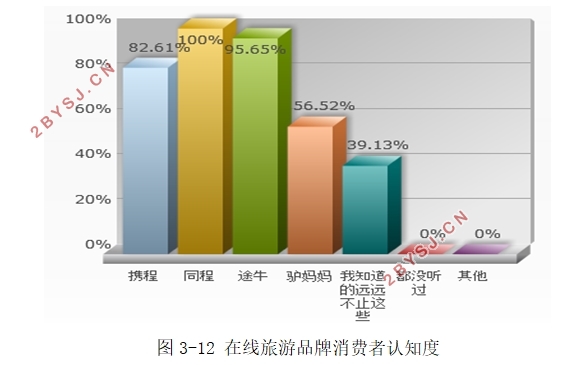在线旅游与传统旅游的比较研究(附调查问卷)
无需注册登录,支付后按照提示操作即可获取该资料.
在线旅游与传统旅游的比较研究(附调查问卷)(任务书,论文19000字)
摘要
目前,随着我国的经济高速发展,人民生活水平日益提高,物质需求明显下降,情感体验需求直线上升。进入情感体验时代,消费者更加关注能使情感愉悦满足的产品,所以旅游行业大力发展。传统旅游早已深入人心,然而,互联网的大力发展,电子商务行业的兴起,在线旅游也成为旅游行业不可小觑的一股力量。市场竞争如此激烈,在线旅游与传统旅游互不相让,孰优孰劣难分高下。
本文在传统旅游和在线旅游的基础上分析了各自的利弊,通过问卷调查进一步深入分析,并且举例具体的传统旅行社中国广之旅旅行社和在线旅游同程旅行社作为比较。通过以上的对比调查,总结出在线旅游和传统旅游的比较研究,最后再对在线旅游和传统旅游做出发展期望。
关键词:在线旅游 传统旅游 利弊分析
The comparative study of online travel and the
traditional tourism
Abstract
At present, along with our country economy high speed development, people's living standard is increasing day by day, the material demand declined obviously, emotional experience demand has soared. Into the era of emotional experience, consumers can pay more attention to satisfy the emotional pleasure, so to develop the tourism industry. Traditional tourism already thorough popular feeling, however, the developing of the Internet, the rise of e-commerce industry, online travel has become a force to be reckoned with in the tourism industry. The market competition is so fierce, online travel to outdo each other with the traditional tourism, neck with relative merits.
In this paper, on the basis of the traditional tourism and online travel analyzes the respective advantages and disadvantages, through questionnaire survey further in-depth analysis, and an example of specific traditional Chinese GuangZhiLv travel agencies and online travel agency with the travel agency for comparison. Through the comparison of the above investigation, summed up the comparative study of traditional online travel and tourism, and then expect to traditional online travel and tourism development.
Key words: Online travel; The traditional tourism; Analysis the pros and cons

目录
摘要 I
Abstract II
第一章 引言 1
1.1 研究背景 1
1.2 研究目的和意义 2
1.3 研究内容 2
1.4 研究思路和方法 2
1.4.1 研究思路 2
1.4.2 研究方法 3
第二章 文献综述 4
2.1 传统旅游概述 4
2.1.1 传统旅游的特点 4
2.1.2 传统旅游存在的问题 4
2.2 在线旅游概述 5
2.2.1 在线旅游的特点 5
2.2.2 在线旅游的存在问题 5
2.3 相关研究现状 6
第三章 旅游方式选择调查分析 7
3.1 调查问卷的设计 7
3.1.1 设计目的 7
3.1.2 设计原则 7
3.1.3 调查对象 7
3.1.4 调查内容 7
3.1.5 调查方法与数据来源 7
3.1.6 调查问卷的回收 7
3.2 调查分析 8
3.2.1 消费者特点 8
3.2.2 消费者的出行方式 9
3.2.3 在线旅游和传统旅游的对比 10
3.2.4 基于调研数据在线与传统旅游分析 13
第四章 基于案例的在线旅游与传统旅游比较分析 15
4.1 在线旅游与传统旅游营销策略分析及比较 15
4.1.1 在线旅游--同程案例策略分析 15
4.1.2 传统旅游—广之旅案例营销策略分析 15
4.1.3 在线旅游与传统旅游营销策略比较 16
4.2 在线旅游与传统旅游各自优点及比较 18
4.2.1 在线旅游的优点分析 18
4.2.2 传统旅游的优点分析 18
4.2.3 在线旅游与传统旅游的优点比较 19
4.3 在线旅游与传统旅游存在问题及比较 19
4.3.1 在线旅游存在的问题分析 19
4.3.2 传统旅游存在的问题分析 21
4.3.3 在线旅游与传统旅游的问题比较 22
第五章 在线旅游和传统旅游的发展期望 24
5.1 解决现有问题的方法 24
5.1.1 在线旅游的问题解决办法 24
5.1.2 传统旅游的问题解决办法 24
5.1.3 两种旅游方式问题的综合解决办法 25
5.2 在线旅游和传统旅游发展趋势 26
5.2.1 在线旅游的发展趋势和方向 26
5.2.2 传统旅游的发展趋势 26
结语 27
参考文献 28
附录 30
致谢 31
